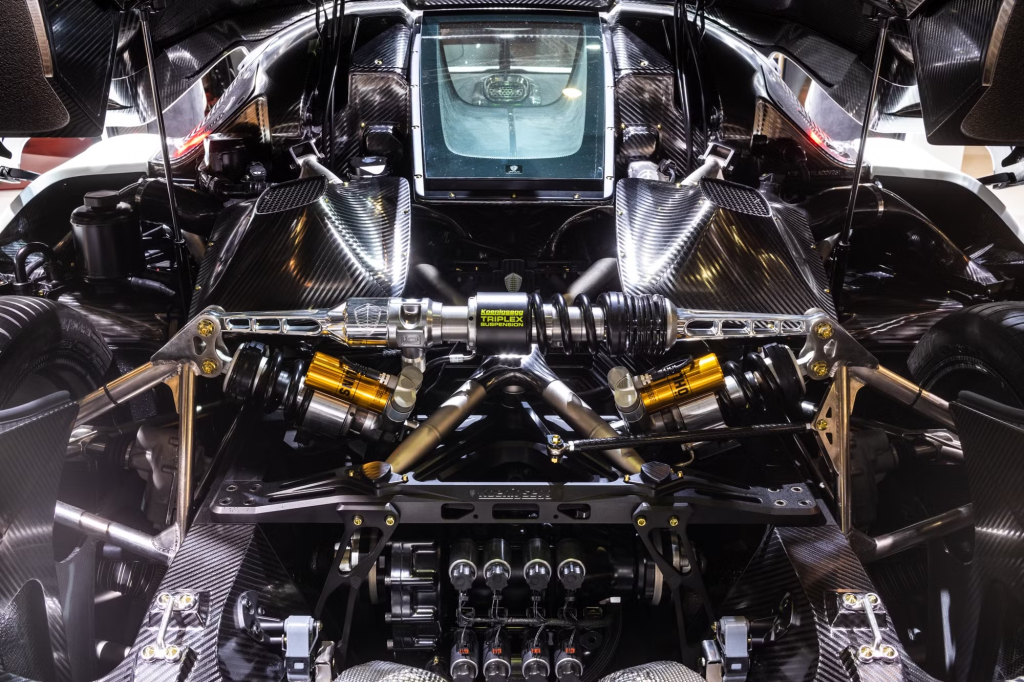On June 27, at an airfield in Örebro, Sweden, Koenigsegg unleashed the Jesko Absolut hypercar to reclaim its 0–400–0 km/h record. This record-breaking event was both a testament to engineering excellence and a spectacle of precision.

The company’s test driver, Markus Lundh, was behind the wheel, clocking an astonishing 27.83 seconds. This performance eclipsed the previous 28.81 seconds set in 2023 by another Koenigsegg model, the Regera.
But this was just the beginning. Lundh continued to push the Jesko Absolut to its limits, hitting a blistering top speed of 256 mph (412 km/h) during the same run.

This feat secured three additional records: acceleration to 400 km/h in 18.82 seconds, 250 mph in 19.20 seconds, and completing the 0–250–0 mph sprint in 28.27 seconds. The numbers speak for themselves, yet they only hint at the immense capabilities of this remarkable machine.
The Power Beneath the Hood of Jesko Absolut Hypercar
What makes the Jesko Absolut such an extraordinary vehicle? At its core is a twin-turbocharged 5.0-liter V8 engine, specially tuned to deliver a staggering 1,600 horsepower when running on E85 fuel.

This powertrain isn’t just an engineering marvel; it’s a statement of intent. Every component of the Jesko Absolut is designed for one purpose: speed.
The record attempt wasn’t just about raw power, though. Precision engineering played an equally vital role. To ensure optimal conditions, the run was conducted early in the morning, around 5 a.m., when wind levels were calm and the air and track temperatures were low.

The car itself was kept as close to standard as possible, with only a roll cage for safety and a seat borrowed from the Koenigsegg One:1. Even the tires—Michelin Pilot Sport Cup 2 R—were standard, further highlighting the production-ready nature of the Jesko Absolut.
Breaking Records, Inspiring Confidence
For Koenigsegg’s CEO, Christian von Koenigsegg, these achievements were more than just records—they were validation. “This record run validated the accuracy of the simulated and calculated performance of the Jesko Absolut,” he remarked. “It gives us great confidence in its ability to outright be the fastest fully homologated production car in the world.”

Von Koenigsegg’s words underscore the significance of this accomplishment. It’s not just about numbers on a sheet; it’s about confirming what the company already believed—that their engineering and design philosophy is unrivaled. Beyond that, it sets the stage for future challenges. The Jesko Absolut may be the fastest car Koenigsegg has ever built, but the company is already eyeing new records with the Jesko Attack, a track-focused variant of the same model.
A Moment of Reflection
The Jesko Absolut’s record-breaking run is a reminder of what’s possible when human ambition meets cutting-edge technology. It’s not just a story of speed; it’s a narrative of determination, precision, and a refusal to settle for anything less than extraordinary. In much the same way that Sydney McLaughlin-Levrone took her sport to new heights, Koenigsegg has once again proven that the boundaries of possibility are there to be shattered.

These milestones are separated by geography and context but united by a shared ethos: the relentless pursuit of excellence. For McLaughlin-Levrone, it’s about perfecting her stride and mastering the hurdles. For Koenigsegg, it’s about pushing the limits of automotive performance. In both cases, the results are nothing short of awe-inspiring.
What’s Next?
For Koenigsegg, the future looks as fast as its cars. With the Jesko Absolut validated as one of the most formidable vehicles on the planet, the company’s sights are now set on the Jesko Attack and its potential to dominate the racetrack. Christian von Koenigsegg’s vision is clear: to continue pushing the limits of what’s possible, not just in terms of speed, but in redefining what a production car can achieve.

As for Sydney McLaughlin-Levrone, her journey is far from over. Each new race presents an opportunity to refine her technique, strengthen her resolve, and inspire countless others. Like Koenigsegg, she has shown that true greatness lies not in resting on past achievements but in the unwavering desire to reach even higher.
Conclusion
The stories of McLaughlin-Levrone and Koenigsegg remind us that greatness is not a destination but a journey. Whether on the track or the road, breaking records is about more than setting benchmarks—it’s about rewriting the narrative of what’s possible. As the Jesko Absolut roared down the airfield in Sweden and McLaughlin-Levrone sprinted toward Olympic glory, they left behind more than just records. They left a legacy that challenges us to aim higher, push harder, and never stop striving for the extraordinary.

